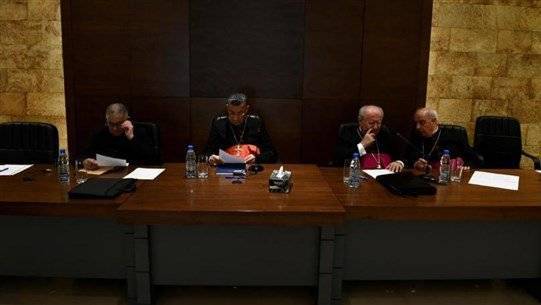The Maronite bishops held their monthly meeting at the summer patriarchal headquarters in Diman, chaired by His Beatitude Cardinal Mar Bechara Boutros Al-Rahi, and attended by the major superiors of the Maronite religious orders. They discussed ecclesiastical and national matters. At the end of the meeting, they issued the following statement:
- In light of the suspicious campaign targeting the patriarchate and His Beatitude politically and in the media, which has intensified with the clarity of his national stance and steadfastness regarding the required steps to save the country and its people from their daily struggles, as well as economic and security issues, and their fate. The bishops affirm their full support for those steps, particularly regarding the necessity of forming a new government and electing a new president in accordance with the constitution, and adopting reforms aimed at placing Lebanon on the path to recovery. They call on political leaders to engage in dialogue as a means to solutions, rather than wasting time in distributing unfounded accusations, while the patriarchate remains committed to its historic duty of safeguarding Lebanon and defending the Lebanese people.
- The bishops extend their support and solidarity to their brother, His Excellency Bishop Moussa Al-Hajj, the pastor of the Diocese of Haifa and the Holy Lands, and the patriarchal deputy for Jerusalem and the Hashemite Kingdom of Jordan. They confirm that his charitable initiatives alongside the suffering and needy Lebanese from all sects should be met with respect and appreciation by state officials. They strongly condemn the fabricated incident he faced at the Naqoura crossing, demanding that the relevant authorities respect ecclesiastical law and traditions, as well as Lebanese civil law, especially the memorandum issued by General Security dated April 29, 2006, under number 28/A/1/P/M/D, which specifies the inspection mechanism assigned to the military police (MP) belonging to the international peacekeeping forces, and the permissions that Bishop Al-Hajj did not exceed. They demand the return of the passport to His Excellency and the release of the confiscated assistance, which he is entrusted with to distribute to its rightful owners, particularly in these difficult circumstances they are enduring.
- Two years have passed since the Beirut port explosion disaster, and the state has not taken any serious steps to uncover the truth and hold accountable those responsible for this crime of the century, to restore justice to the victims and compensate their families, as well as the affected, and to put an end to the obstruction of justice for Beirut and its people. The bishops demand the lifting of this injustice from the homeland and citizens, the regulation of judicial affairs in the country, and the protection of the judiciary from any harm to its presence in public as well as private life, free from political interference and unprofessional practices that are outside the law and customary, and in commitment to the independence of the judiciary and cleansing it from personal and factional interests that have long harmed it, especially in recent decades.
- The bishops express their deep concern regarding the wave of protest and anger among workers and employees in various sectors, in light of rising prices and the declining purchasing power of the Lebanese lira. They urge authorities to respond to the advice of Lebanon's friends and the conditions for external financial assistance as quickly as possible, which is considered the only gateway to begin emerging from the escalating economic crisis.
- The bishops express their grave worry over the indicators of confrontation between the Lebanese and Syrian displaced persons in several regions and camps. They appeal to the international community and the officials of the two countries to expedite addressing the situation in a manner that ensures the safety of all and represents the beginning of a path that will provide a safe return for the displaced to their homes, after violence has significantly decreased there, making it possible to work towards that resolution.
- The month of August is particularly Marian, as the church celebrates on the fifteenth the feast of the Assumption of the Virgin Mary into heaven, body and soul, which is one of its greatest feasts, as well as the feast of the Transfiguration of the Lord and several saints. Through their intercession, may God return this month to everyone with goodness and blessings, and bestow upon Lebanon and the world the graces of unity, justice, peace, and reconciliation among peoples.




